Inaction and Euroscepticism Are Killing the European Project
Adelina Marini, October 28, 2015
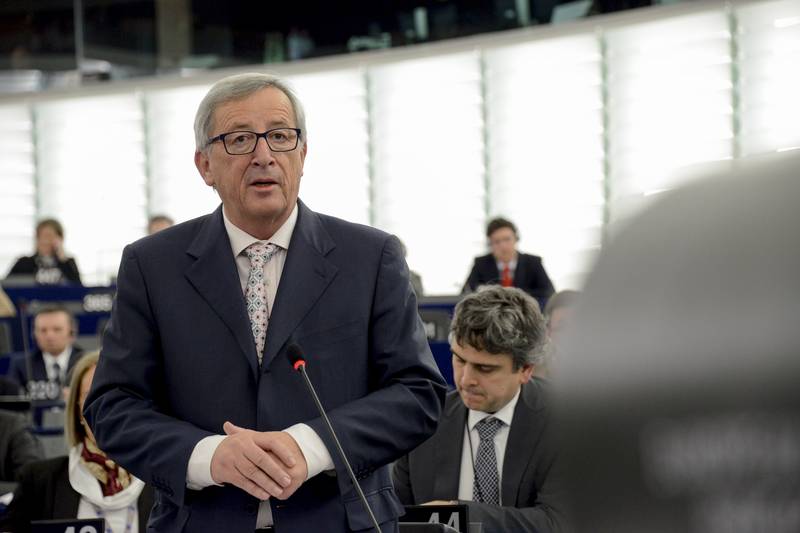 We could add in scorning our values any time we feel heat. Those are the conclusions of the Tuesday morning debate in the European Parliament, during which the bosses of the European Commission and the European Council, Jean-Claude Juncker and Donald Tusk, gave an account of the October 15th summit and the meeting of the leaders of states along the Western Balkans route last Sunday in Brussels. The two institutional leaders focused on criticism on the Balkan states and member states in general, while the inability of the EU once more to find a solution to the refugee crisis broke the dam to an analytically-accusatory debate among the main political groups.
We could add in scorning our values any time we feel heat. Those are the conclusions of the Tuesday morning debate in the European Parliament, during which the bosses of the European Commission and the European Council, Jean-Claude Juncker and Donald Tusk, gave an account of the October 15th summit and the meeting of the leaders of states along the Western Balkans route last Sunday in Brussels. The two institutional leaders focused on criticism on the Balkan states and member states in general, while the inability of the EU once more to find a solution to the refugee crisis broke the dam to an analytically-accusatory debate among the main political groups.
Jean-Claude Juncker discovers the wheel
The veteran in European politics former Prime Minister of Luxembourg Juncker’s surprise at the way in which Balkan politics functions was just as surprising. European integration of states from the Western Balkans, which are in the beginning of their European way, has been stuck for years, mainly because of the total inactivity and disinterest of the EU, as well as a lack of understanding for the issues in this region, which is healing from the devastating disintegration of Yugoslavia. The Union has learned just part of the lessons with Bulgaria and Romania, which were accepted unprepared into the EU with a crutch – the Cooperation and Verification Mechanism (CVM). It does not however show the full picture, which is a volatile mix of historic wounds, shrew mentality, machismo politics, and a media environment in which extreme emotions are a leading factor. All that, combined with the latest fashion tendencies in the EU – Euroscepticism, re-nationalism, and radical Schengenism.
Considering the EU enlargement process is one of the oldest European policies, praised to be the most successful as well, the amazement of the Commission chief comes as a real surprise, who, at his election last year, announced that he did not expect a further enlargement during his term, which got deciphered as a push on the pause-button of the process. In front of MEPs he said that he was amazed at the fact that he needed to organise the region leaders to sit down and talk. He expected them to gather on their own and solve their own issues. This statement at the background of four consecutive EU summits, dedicated to the refugee crisis, which all ended with much talk and miniscule actions, as Juncker alone admitted yesterday morning in Strasbourg, sounded not less than amazing.
“The fact that I had to call this meeting shows that the EU is not in a good shape as it should be, because I would much have preferred not to call such a summit. It should have been possible these issues to be resolved by the countries themselves”, said the Commission president as if the refugee crisis is their own problem. He started his statement dramatically with the words that along the Western Balkan route refugees go through icy waters, sleep in the wind and mud, which soon will turn into snow and ice. First he said the Sunday discussion was constructive, but later he said it was challenging. “It's quite astonishing that we had to undertake a huge effort to convince some of our member states to inform other member states about the refugee flows heading to the borders. What seems for someone who is inspired [by] basic common sense surprisingly, surprising that we have to convene a meeting to ask the member states to inform each other about the refugee movements”, said the former Luxembourg PM switching constantly from German to French and to English, and once again stressed that this showed the EU was not in good shape.
Later, he went on to criticising EU member states that dug a huge abyss between promises and deeds. To him, the main purpose of the October 15th meeting was to bring member states back to the commitments they made at the emergency summit on September 23rd, but, alas, with a miniscule result. “The member states are still moving slowly at a time when they should be running”, he said and reminded that the European migration and asylum agency (EASO) had asked for 374 additional experts. Until Monday, 20 member states had volunteered 145. Frontex asked for 775 people, but has received offers for only 326. The relocation, agreed on after so much hard work in September and also dubbed a historic deal, does not work well either, said the EC boss. Almost all member states have appointed contact points, but liaison officers in Italy have been appointed by eight states only, and for Greece – just three.
European Parliament President Martin Schulz (Socialists and Democrats, Germany) also scolded the inactivity of member states and criticised the South-Eastern members and non-members alike. In an unorthodox statement before the start of the debate he stated that the Sunday meeting showed that the situation in the Western Balkans is “extremely worrying, including politically”. Tens of thousands of people are using the Western Balkans route to flee to Europe. They have no shelter, they are hungry, crossing borders at night, added Mr Schulz. He admitted that the atmosphere on Sunday was “deeply worrying”. “Governments of the right and of the left sometimes think 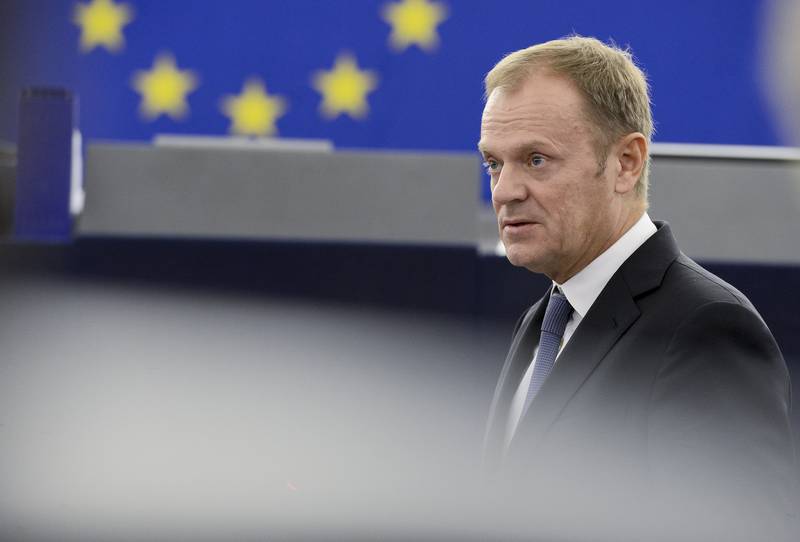 national interests are more important than community solutions. What suffers is the refugees and the EU”, he said.
national interests are more important than community solutions. What suffers is the refugees and the EU”, he said.
European Council President Donald Tusk went even further by speaking of the end of the European project. In his words, the refugee crisis is the greatest challenge that the EU has faced in decades. “I have no doubt that this challenge has the potential to change the European Union we have built. It has the potential even to destroy achievements such as border-free travel between Schengen countries. And what is even more dangerous, it has the potential to create tectonic changes in the European political landscape. And these are not changes for the better”, said the European president and asked for an extraordinary European solidarity. According to him, there needs to be placed an end to the needless debate between proponents of external borders policing and advocates of solidarity and openness. “We need both”, he said in the manner of king Solomon.
Who’s to blame?
Manfred Weber, leader of the EPP group in the European Parliament (Germany), announced that we are witnessing the downfall of nation-states. “This is the Europe of Farage and Le Pen. Europe that produces no solutions”, he stated in a heated speech. Later he reminded, answering accusations that the EPP is closing its eyes to the anti-European actions of Hungarian PM Viktor Orbán, that apart from him three other socialist PMs voted against the common European decision. He also reminded that Dutch liberals have also not been too straightforward on the issue. His words sparked a heated exchange of remarks, rejoinders, and statements in plenary. Gianni Pittella, leader of the Socialists and Democrats group (Italy), tried to calm things down by saying it is way too early to pronounce the European project dead. He did urge, however, all pro-European forces to unite against the anti-es – anti-Europeans, anti-globalists, anti-Islamists, anti-Israelis, anti-Russians, and anti-migrants.
The leader of European Conservatives and Reformists, Syed Kamall (Great Britain), urged for an end to who is a pro-European and who isn’t. Actions are needed, he said. As usual, Liberal leader Guy Verhofstadt (Belgium) literally exploded. “Dear Manfred, this is not a race between liberals, rightists, and socialists. This is a race between nationalists and populists, who wish to destroy the EU, not between us”. The debate dealt a strong card to Nigel Farage (Great Britain), co-chairman of the Europe for Freedom and Direct Democracy group, who used the opportunity to accuse the EU of authoritarianism again. Reminding how Berlusconi was substituted by “an EU minion”, the attitude towards Greece, and now the elections in Portugal, he stated that the Brezhnev Doctrine is being realised in Europe at the moment. States have democratic rights only if they like the European project, he said and once more expressed hope that Great Britain wold leave this union. Within the talking shop there crystallised one more zone of cruel competition – between conservatives and Farage’s people – over who was first to initiate a referendum on Great Britain’s EU membership.
Spanish far-left MEP Marina Albiol Guzmán directly asked that parties disregarding human rights be expelled from the European political families. She listed potential expulsion candidates by saying that in Slovenia, ruled by a Liberal government, police is using tear gas against refugees, Hungary’s EPP government is using dogs, and in Bulgaria, where the government is also of the EPP group, police shot an Afghan refugee dead. The leader of the Spanish anti-system movement “Podemos” Pablo Iglesias used his last speech as a MEP after handing in his resignation in order to commit himself to the parliamentary elections in Spain on December 20th, to accusing all parties of not being on the people’s side at all.
Of what use are values?
Besides the surprise at discovering the wheel, it was surprising that MEPs paid hardly any attention to the scandalous statement of Jean-Claude Juncker on Turkey. He announced at the start of the talks that EU needed to work together with Turkey and that he understands all arguments regarding the problems in Turkey. “Therefore we really face two possibilities and these are the options we can either say that the EU and the EU institutions have outstanding issues with Turkey - human rights, press freedom and so forth - but where is that going to take us in our discussions with Turkey?”, he asked and answered: “We know there are shortcomings but we need to involve Turkey in our initiatives, because Turkey agrees with us that we need to take actions to try to resolve this crisis into the best way possible. We want to make sure that no more refugees are coming to the EU from Turkey”, he said.
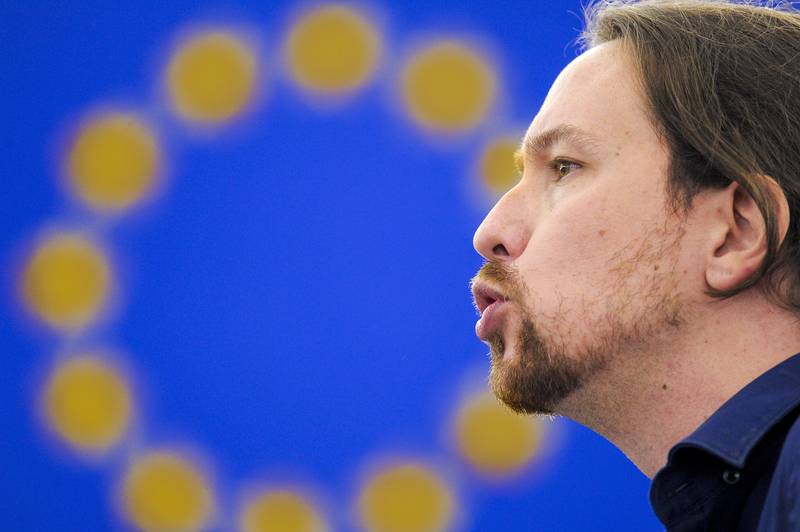
There were a few statements opposing such a thesis. Gianni Pittella (Socialists and Democrats, Italy) urged not to sign a blank check to Turkey’s government and Rebecca Harms from the group of the Greens and European Free Alliance (Germany) warned that working with Turkish President Erdoğan should be extremely careful. Guy Verhofstadt was outraged that Europe is not present at important global meetings on foreign affairs issues, giving as an example the recently held meeting in Vienna between the USA, Russia, Turkey, and Saudi Arabia on the future of Syria. “High Representative Mogherini happened to be also in Vienna, but was not invited to the meeting”, he recalled. “Unlike the Vienna congress in 1815, where the European nations decided on the future of our continent, it is now the other powers that decide for us. The European Union is treated like a colony and we have only ourselves to blame for it”, continued the former Belgian PM in his typical style.
Jean-Claude Juncker did not wait for the end of the debate. In his stead at the end spoke Commissioner on Migration Dimitris Avramopoulos (Greece, EPP), who said that the refugee crisis was being used for internal political goals, to swing popular opinion. There were praises heard here and there on the Balkan states finally being included in the European debate, but they drowned in the shootout between pro-European political powers and the Euro-sceptics. Meanwhile, bilateral accusations between South-Eastern EU members continue, which might also surprise the EC President.
Translated by Stanimir Stoev
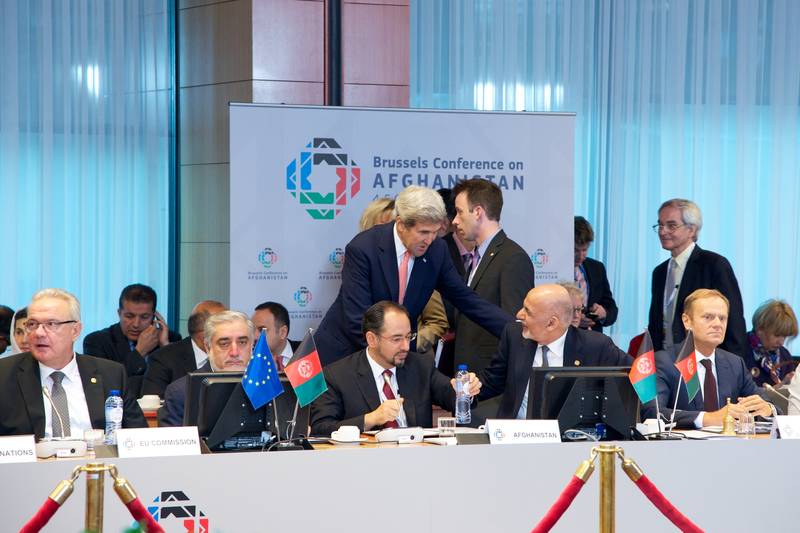 | © Council of the EU
| © Council of the EU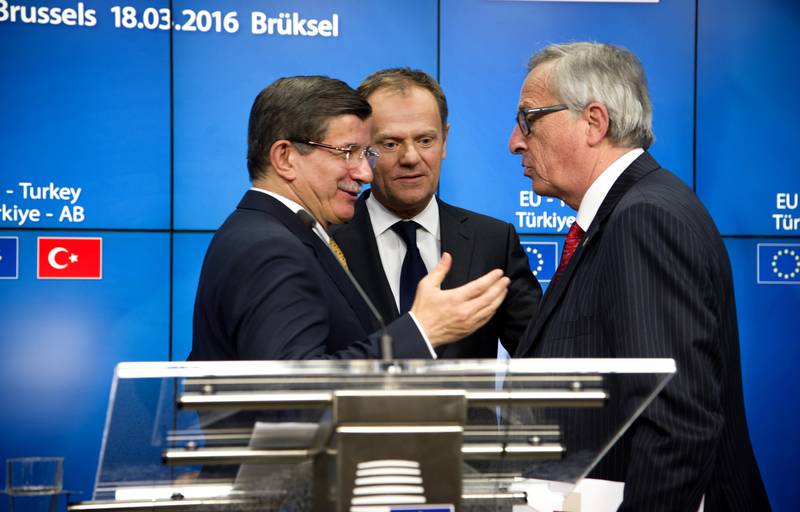 Davutoglu, Tusk, Juncker | © Council of the EU
Davutoglu, Tusk, Juncker | © Council of the EU Bakir Izetbegovic, Andrej Plenkovic | © Council of the EU
Bakir Izetbegovic, Andrej Plenkovic | © Council of the EU Aleksandar Vucic, Recep Tayyip Erdogan | © Serbian Presidency
Aleksandar Vucic, Recep Tayyip Erdogan | © Serbian Presidency Jean-Claude Juncker, Zoran Zaev | © European Commission
Jean-Claude Juncker, Zoran Zaev | © European Commission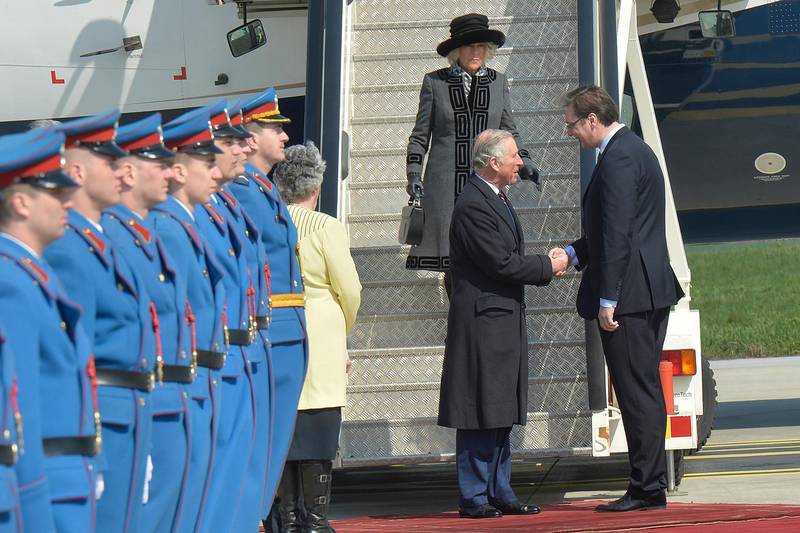 | © Vlada RS
| © Vlada RS